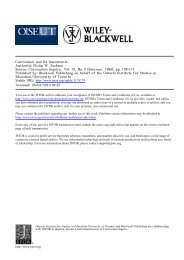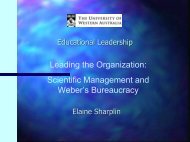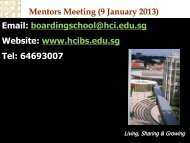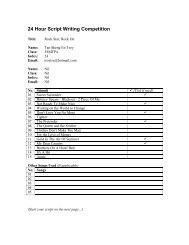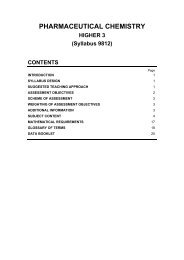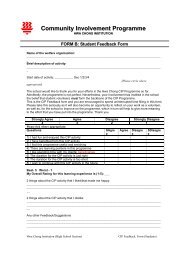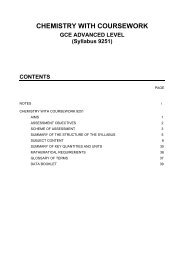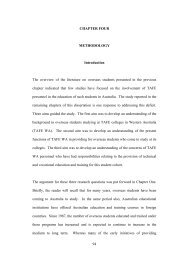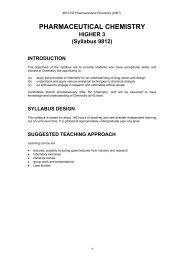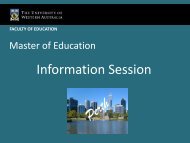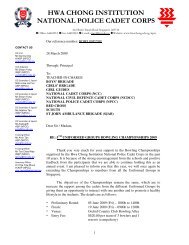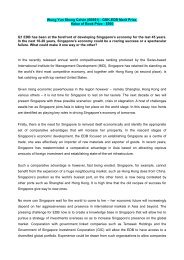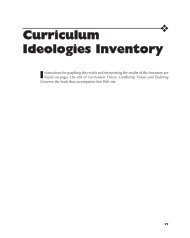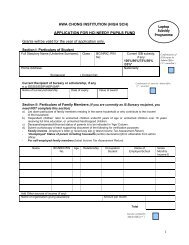Prologue
Prologue
Prologue
Create successful ePaper yourself
Turn your PDF publications into a flip-book with our unique Google optimized e-Paper software.
AN ANALYSIS OF CURRICULUM POLICY<br />
FOR UPPER SECONDARY SCHOOL HISTORY<br />
IN WESTERN AUSTRALIA FROM 1983 TO 2000.<br />
William J.R. ALLEN<br />
This thesis is presented in partial fulfilment for the degree of<br />
Doctor of Education<br />
at The University of Western Australia<br />
2004
DECLARATION<br />
This thesis is my own work, and no part of it has been submitted for a degree at this, or at any<br />
other, university.<br />
William J. R. Allen<br />
ii
ABSTRACT<br />
The aim of the study in this thesis was to conduct a longitudinal analysis of curriculum<br />
policy for upper secondary school History in Western Australia (WA) from 1983 to 2000.<br />
During this period three significant changes were made to the History curriculum for students in<br />
Years 11 and 12, in 1982-3, from 1985 to 1990 and in 1996-97. These changes evolved from a<br />
number of influences. Also, they impacted on, and were reflected in, relevant History<br />
curriculum documents, and had a considerable impact on the teaching and learning of the<br />
subject.<br />
For the purpose of the research, policy was conceptualised as a trajectory, with each<br />
phase having three principal contexts: the context of influence, the context of policy text<br />
production, and the context of practice (Ball, 1993, 1994a; Ball & Bowe, 1992; Bowe, Ball &<br />
Gold, 1992). Analysis of the context of influence focuses on the antecedents and pressures<br />
leading to the gestation of policy. These include: the various social, economic, political and<br />
educational factors driving the policy; the influences of pressure groups and broader social<br />
movements; and the historical background to the policy, including previous developments and<br />
initiatives. The context of policy text production is concerned with the generation of the policy<br />
texts and includes an analysis of the policy documents themselves. Analysis of the context of<br />
practice involves investigating the interpretation and enactment of the policy by those<br />
responsible for carrying it out, and by those for whom it is intended.<br />
Qualitative methods have been used for data collection and analysis. The primary<br />
sources of data collection were a range of relevant documents, supported by semi-structured, indepth<br />
interviews. Analysis was based on the methods of data reduction, data displays and<br />
drawing conclusions.<br />
The findings of the study reveal the complexities of the policy process. In particular,<br />
they reveal the struggles by different interest groups to bring their understandings and views of<br />
the nature of History teaching to bear on upper school curricula. Within each of the three phases<br />
of change different interest groups were able to dominate the contest to impose their versions of<br />
the nature of History, and how it should be taught and assessed. The changing nature of History<br />
in the post-compulsory years of schooling in WA in the last two decades of the twentieth<br />
century is explained by the changing influence of a range of forces, which emerged from<br />
iii
different levels and impacted on the subject, in the context of a constantly shifting policy<br />
environment.<br />
The findings are brought together in a meta-analysis which identifies four major trends<br />
in the History curriculum policy process in WA. These trends are ‘curriculum as worthwhile<br />
knowledge’, ‘curriculum policy as a form of control, and its impact upon teacher<br />
professionalism’, ‘the role of the state in the policy process’, and ‘public policy perspectives on<br />
the curriculum’. The meta-analysis concludes with an assessment of Looney’s (2002) argument<br />
that Ball's model of policy analysis as adapted for use in this study provides a satisfactory<br />
unitary theory of curriculum in a 'post-Tyler' age.<br />
The findings of the research provide implications for future education policy processes,<br />
particularly in the light of proposed curricular changes to upper school subjects in WA, to be<br />
mandated in 2007. There are also potential implications for curriculum and for policy, in theory<br />
and in practice in contexts beyond the Australian state of WA.<br />
Style<br />
The style and format adopted in the production of this thesis is that employed by the<br />
American Psychological Association as recommended in their Publication Manual (APA,<br />
2001).<br />
iv
TABLE OF CONTENTS<br />
CHAPTER 1 INTRODUCTION 1<br />
Purpose and significance 2<br />
Background 4<br />
History curricula in Western Australia before 1983 5<br />
The curriculum policy context in Western Australia 9<br />
A theoretical framework for policy analysis 14<br />
An overview of research methods 18<br />
Data collection 20<br />
Data analysis 22<br />
Structure of the thesis 22<br />
CHAPTER 2<br />
DEVELOPMENTS IN HISTORY TEACHING SINCE 1960, IN<br />
ENGLAND AND WALES, THE UNITED STATES OF<br />
AMERICA AND AUSTRALIA. 24<br />
Introduction 24<br />
The nature of the crisis in History teaching in an international context and some<br />
responses 26<br />
The nature of the crisis in history teaching in England and Wales, and<br />
some responses 26<br />
The nature of the crisis in history teaching in the United States of America,<br />
and some responses 31<br />
The nature of the crisis in history teaching in Australia, and some<br />
responses 35<br />
v
Developments in philosophy, pedagogy, psychology and sociology, and their<br />
influence on History curricula 41<br />
Ontology, epistemology and the changing nature of History 42<br />
Pedagogical influences on the changing nature of History 47<br />
Educational psychology and theories of learning 50<br />
Sociology and its impact on History curricula 53<br />
Conclusion 57<br />
CHAPTER 3 RESEARCH METHODOLOGY 58<br />
Introduction 58<br />
Aim and research questions 58<br />
The policy analysis framework 61<br />
The framework of Ball and others 62<br />
The framework of Taylor and others 65<br />
Vidovich’s framework 67<br />
Implications of the policy framework for the research methodology 69<br />
Qualitative research approaches 70<br />
Interpretivism as the principal research paradigm 70<br />
Issues of reliability and validity 73<br />
Data collection and analysis 75<br />
Documents as data 75<br />
Interviews 79<br />
Data analysis 83<br />
Conclusion 86<br />
vi
CHAPTER 4 FIRST PHASE OF THE POLICY PROCESS: 1983 – 84 88<br />
Introduction 88<br />
The institutions of upper school curriculum policy making in Western Australia,<br />
with special reference to History curricula 89<br />
Context of influence 92<br />
Social factors influencing the policy process 93<br />
Political factors influencing the policy process 94<br />
Economic factors influencing the policy process 95<br />
Cultural factors influencing the policy process 97<br />
Educational factors influencing the policy process 98<br />
Context of policy text production 106<br />
Analysis of the contestations in the process of formulating History<br />
curriculum policy 107<br />
Analysis of the policy texts 115<br />
Context of practice 121<br />
Impact of the new curriculum on the teaching and learning of History 123<br />
Impact of the new curriculum on levels of professional morale 126<br />
Impact of the new curriculum on the teaching of Australian History 127<br />
Impact of the new curriculum on curriculum pressure 128<br />
Impact of the new curriculum on numbers of students taking History in<br />
Years 11 and 12 131<br />
Conclusion 132<br />
CHAPTER 5 SECOND PHASE OF THE POLICY PROCESS: 1985 TO 1990 134<br />
Introduction 134<br />
vii
The changing institutions of upper school curriculum policy making in Western<br />
Australia, after 1984, with special reference to History curricula 135<br />
Context of influence 137<br />
Economic factors influencing the policy process 138<br />
Social factors influencing the policy process 140<br />
Political factors influencing the policy process 141<br />
Broader educational factors influencing the policy process 142<br />
Context of policy text production 147<br />
Analysis of the policy texts 161<br />
Context of practice 168<br />
Impact of the new curriculum on the teaching and learning of History 168<br />
Impact of the new curriculum on levels of professional morale 172<br />
Impact of the new curriculum on the teaching of Australian History 177<br />
Impact of the new curriculum on curriculum pressure and student<br />
enrolments in History 179<br />
Conclusion 181<br />
CHAPTER 6 THIRD PHASE OF THE POLICY PROCESS: 1996-97 183<br />
Introduction 183<br />
Changes to the institutions of upper school curriculum policy making in Western<br />
Australia, from 1990 – 1997, with special reference to History curricula 184<br />
Context of influence 185<br />
Economic factors influencing the policy process 186<br />
Political factors influencing the policy process 187<br />
Context of policy text production 197<br />
Analysis of the policy texts 209<br />
viii
Context of practice 219<br />
Impact of the new curriculum on the teaching and learning of History 220<br />
Impact of the new curriculum on assessment structures and practices 224<br />
Impact of the new curriculum on levels of professional morale 228<br />
Impact of the new curriculum on the teaching of Australian History 229<br />
Impact of the new curriculum on curriculum pressure and student<br />
enrolments in History 232<br />
Conclusion 233<br />
CHAPTER 7 META-ANALYSIS AND DISCUSSION 235<br />
Introduction 235<br />
Meta-analysis of the research findings 236<br />
Curriculum as worthwhile knowledge 236<br />
Curriculum policy as a form of control and its impact upon teacher<br />
professionalism 245<br />
Role of the state in the policy process 251<br />
Public policy perspectives on the curriculum 258<br />
Conclusion 265<br />
CHAPTER 8<br />
FUTURE DIRECTIONS: IMPLICATIONS FOR CURRICULUM<br />
AND POLICY; THEORY AND PRACTICE 269<br />
Introduction 269<br />
Implications for policy 270<br />
Implications for curriculum 272<br />
Implications for theory 275<br />
Implications for practice 277<br />
ix
Conclusion 278<br />
REFERENCES 280<br />
APPENDICES 297<br />
LIST OF FIGURES<br />
3.1 A modified policy cycle: Incorporating macro constraint and micro agency 69<br />
4.1 The bodies involved in determining upper school syllabuses and examinations in WA<br />
before 1984, with particular reference to History curricula 91<br />
x
LIST OF ABBREVIATIONS<br />
ABS Australian Bureau of Statistics<br />
AEC Australian Education Council<br />
AISWA Association of Independent Schools in WA<br />
ALP Australian Labor Party (Federal branch and State branch)<br />
ASAT Australian Scholastic Aptitude Test<br />
BSE Board of Secondary Education<br />
CCWA Curriculum Council of Western Australia (replaced SEA after 1997)<br />
CSE Certificate of Secondary Education<br />
EDWA Education Department of WA<br />
HAWA History Association of WA (later became the HTAWA)<br />
HJSC History Joint Syllabus Committee (1975 – 1992)<br />
HSC History Syllabus Committee (after 1992)<br />
HTAWA History Teachers Association of WA<br />
JSC Joint Syllabus Committee (one for each TAE / TEE subject)<br />
MOVEET Ministerial Council on Education, Employment and Training<br />
NSW New South Wales<br />
OBE Outcomes-based education<br />
PEB Public Examinations Board (based in UWA 1913 – 1974)<br />
SC Syllabus Committees of the SEA (Replaced JSCs after 1992)<br />
SEA Secondary Education Authority of Western Australia<br />
TAE Tertiary Admissions Examinations (1974 – 1985)<br />
TAEC Tertiary Admissions Examination Committee<br />
TAFE Technical and Further Education<br />
TEE Tertiary Entrance Examinations (After 1986)<br />
TISC Tertiary Institutions Service Centre<br />
USA United States of America<br />
UWA The University of Western Australia<br />
WA Western Australia<br />
xi
ACKNOWLEDGMENTS<br />
First, I acknowledge two outstanding supervisors, Associate Professor Lesley Vidovich and<br />
Professor Tom O’Donoghue. Since I sat in his first class at UWA, Tom has been an inspiring teacher and<br />
mentor. It was Tom who gave me the confidence to pursue a Doctorate, persuaded me to resume study at<br />
UWA, and guided me in the choice of this topic which I have found fascinating. I have valued greatly his<br />
historical skills and attention to detail. Lesley has also been a most inspiring teacher and mentor, for<br />
whom there is never too little time to give support and guidance. I have learnt so much about the policy<br />
process from her, and have enjoyed our many discussions about education, policy and schools. Both<br />
supervisors gave me opportunities to teach in Masters’ programmes abroad, which have deepened my<br />
understandings. They have been caring, wise, friendly and supportive, and my debt to them is enormous.<br />
I acknowledge the valuable contributions of the interview respondents, who not only gave of<br />
their time generously and imparted enormous detail, but also followed up with further advice or sources<br />
of information. I am also most grateful to staff at the Curriculum Council of WA, who always made me<br />
feel very welcome and who gave all possible assistance in the search for documentary evidence. In<br />
particular, I thank Anne Shilling and Maxine Spalding for all their efforts.<br />
Colleagues in schools and History departments have had a huge influence on my career, which is<br />
reflected in this study. In particular, I acknowledge Wilf Hammond, Norman McLeod and the late Tom<br />
Percival, who gave me a love of History teaching at Durham School; Don and Betty Carter at Wesley<br />
College, and Mal Poole; Phil Burns, Mike Kinsella, Greg Symonds and colleagues at Corpus Christi<br />
College; and Chris Lilleyman, Tina Campbell, and my other departmental colleagues at Perth College.<br />
Their wisdom, support, guidance and friendship over the years have been most important.<br />
I have loved teaching History because I have had the opportunity to meet some wonderful young<br />
women and men in my career and I acknowledge most sincerely their contributions what is an opus<br />
amori. Memories of them remain ever fond and strong. In particular, I acknowledge my Year 11 Perth<br />
College History class of 2003, whom to leave was one of the biggest costs of this study.<br />
I have always valued the contribution of my parents, Rena and Bill, who made enormous<br />
sacrifices to give me the best education when I was younger, and for their unconditional love and<br />
support. My deepest thanks go to Pat, Nikki and Ben, and little Bayden, who have always had faith in me<br />
and loved me, and who have supported me through my years of study. They have made huge sacrifices to<br />
allow me to pursue my dreams and study full-time this year and for that, and for everything else, I will<br />
always be so grateful. I dedicate this work to them.<br />
xii



